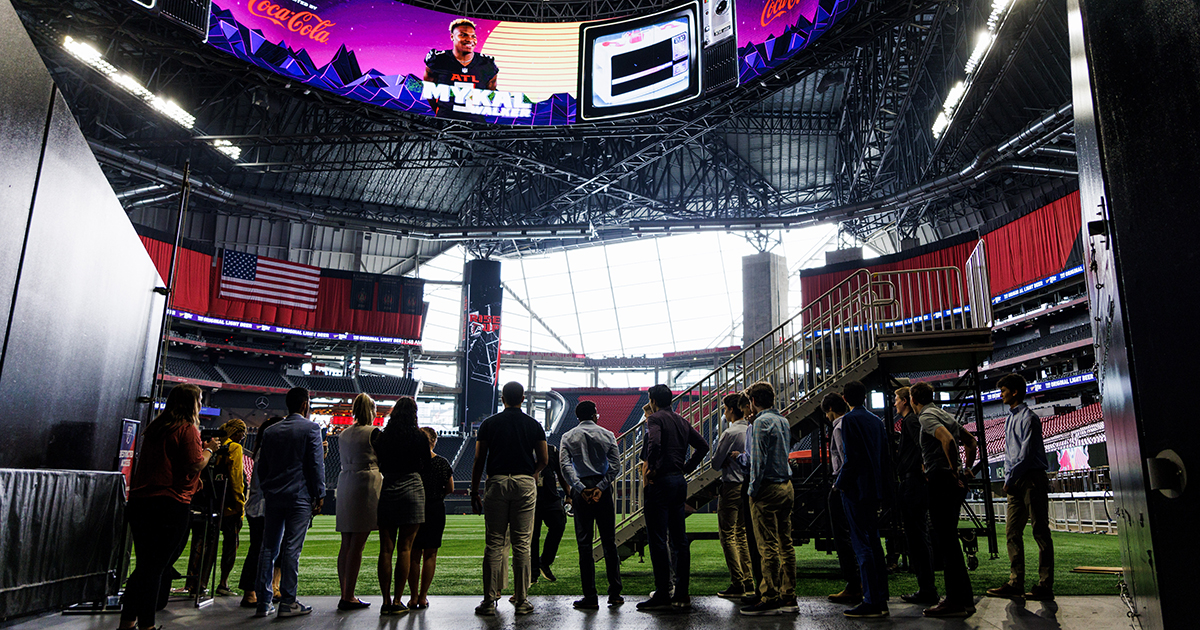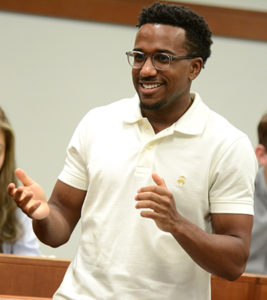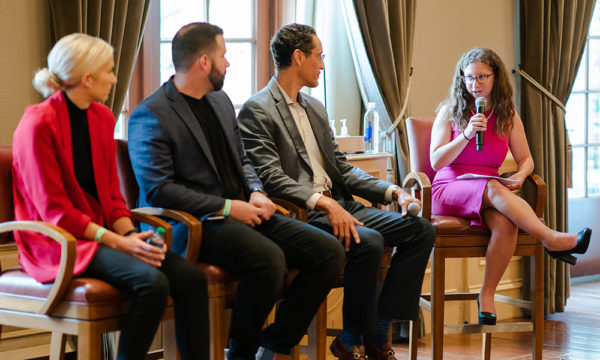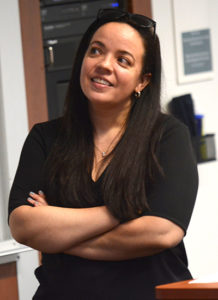Good Company, Good Game Delivers Impact and Inspiration

Carissa Rubin ’25 decided to pursue a career in sports business when she was in the fifth grade and first saw the movie Draft Day. She told her mom that she wanted to be Jennifer Garner’s character when she grew up. “I love how confident and intelligent she was,” Rubin said, “and, most importantly, that she was working actively with sports every single day.”
So, when Rubin was among 18 Babson College students selected for a unique new course on sports businesses in Atlanta this summer, she called her mom, screaming with excitement.
The unique new course—“Good Company, Good Game: Law, Ethics and Leadership in Sports Businesses”—was conceived and taught by Leslie Garbarino, assistant professor of practice in the Accounting and Law Division, with the support of The Arthur M. Blank School for Entrepreneurial Leadership.
The course was based on the examples and values that Arthur M. Blank ’63, H’98 describes in his 2020 book, Good Company, and included a weeklong trip to Atlanta to experience firsthand how his six core values shape the Blank Family of Businesses and AMB Sports + Entertainment.
The students shared their final video projects Friday with Garbarino, their classmates, and some special guests, including Blank School CEO Donna Levin and Brett Jewkes, Blank’s EVP, chief brand, CSR and strategic communications officer, who flew from Atlanta to the Babson campus.
“It was the most incredible experience,” Rubin said. “This course not only shows me that that’s what I want to do as my career, but I can excel in it and I can get to that spot in my career. It’s just the most empowering thing, and I just can’t thank Professor Garbarino and Babson enough for making it happen.”
‘Amazing’ in Atlanta
For Michael Agard ’24, the course was sort of a homecoming. The Atlanta native not only had interned with AMB Sports + Entertainment as a high school student, but he also came to Babson in the first cohort of Arthur M. Blank Leadership Scholars.

Michael Agard ’24, an Atlanta native and Blank Leadership Scholar, had previously interned with AMB Sports + Entertainment.
The highlight of the course was the weeklong trip to Atlanta, following pre-departure classes and group meetings in early August. The 18 Babson students met with an array of leaders with AMB Sports + Entertainment, moderating panels that included executives from Atlanta United FC, the Atlanta Falcons, and the PGA Tour SuperStore. They even experienced a robust Q&A session with Arthur Blank, the famed Babson alumnus whose game-changing $50 million gift helped launch the Blank School.
“It’s an amazing experience,” said Agard, who also met Blank on campus in 2020. “He made this investment because he believes in the future of entrepreneurial leaders and he believes in us. Taking the time to actually talk to us, to guide us, to give us that leadership is amazing. It says a lot about who he is and what he wants for his investment to pay off.”
The Babson students also attended a Falcons practice session, a United game, and an Atlanta Braves game, and they visited the National Center of Civil and Human Rights. They also toured Atlanta’s Westside, where Blank’s Mercedes Benz Stadium (home of the Falcons and United) has served as a catalyst to help rejuvenate the historic neighborhood.
“This course has truly changed my life,” Najah Lorde ’23 said. “It was so inspiring as somebody who is trying to get into a sports business.”
The Value of Core Values
At the heart of the course—and at the heart of the Blank Family of Businesses—are Blank’s core values, which he writes about in his book and which serve as building blocks for the Blank School’s approach to values-based leadership. The six core values—Put People First, Listen and Respond, Include Everyone, Innovate Continuously, Lead by Example, and Give Back to Others—have driven Blank’s successes, from co-founding Home Depot to The Blank Family of Businesses and the Arthur M. Blank Family Foundation.
The values also drive every Blank employee and decision. During the Atlanta visit, Babson students noted that there are no signs stating the values. Instead, every employee—from top executives to guest-service representatives—embodies the values at all times.
“This course has truly changed my life. It was so inspiring as somebody who is trying to get into a sports business.”
Najah Lorde ’23
For Teddy Sourlis ’22—who delayed his Babson graduation so he could take Garbarino’s course—the impact was immense. Sourlis, who played on the Babson men’s basketball team, is the founder and CEO of Men’s Mental, a nonprofit platform that focuses on the mental health of male athletes.
“The course for me was life-changing, from reading the book and learning the core values, but taking it a step further and truly witnessing how these values are ingrained in every single aspect of the businesses,” Sourlis said. “I’ve never witnessed an organization run in this way. And, it was something that inspired me to keep that greater purpose.”
The impact on all of the students was obvious as they each shared their final video presentations. In addition to Agard, Lorde, Rubin, and Sourlis, the students were Christina “Nina” Erixxon ’20, Ethan Glassman ’24, Caroline King ’25, Napat “Oak” Kornsri ’24, Kellen Kruglewicz ’25, Jennifer Lam ’24, Eric Lindholm ’23, Jonathan Liskov ’23, Sumer Mukhey ’24, Michael Pardo ’24, Fabian Ramirez Orozco ’23, Zachary Roman ’23, Kristopher Smith-Reichartz ’23, and Max Weygandt ’24.

Carissa Rubin ’25 (right) moderates a panel discussion with executives from the Blank Family of Businesses during the Atlanta visit. (Photo: Kevin D. Liles/kevindliles.com)
Inspirational Impact
Garbarino pointed to the students’ presentations in which they spoke about not only how the core values impact their lives and careers, but also how they can help develop them deeper in the Babson community.

Leslie Garbarino, assistant professor of practice in the Accounting and Law Division, conceived and taught the Good Company, Good Game course.
“I think it is going to infuse the core values into the Babson community and beyond,” she said. “They’re starting to put them into place in their extracurriculars or in their classroom when they work with other students, and in their careers.
“We have an obligation and a duty to do what we can to share this and to give this back to others,” Garbarino added. “We want to take it and live it and share it and spread those core values, and I think the students gave a zillion examples today of how they’re going to do that.”
Jewkes, the Blank executive who had met the students in Atlanta and observed their final presentations on campus, was particularly moved. “It was very hard for me to not get emotional during the presentations,” he told the students. “Why did I come to Babson? Because every time I come here, I feel this way.”
Jewkes—who also met later with the Blank Leadership Scholars and other Babson community members—was taking notes and communicating with his Blank colleagues in real time, even noting follow-up action items, including with Sourlis about his nonprofit. And, he singled out Rubin, the future sports executive, saying, “Carissa, you can be Jennifer Garner.”
“That made my entire life,” Rubin said. “It’s hard to put into words just how thankful I am for this class.”
Posted in Community




